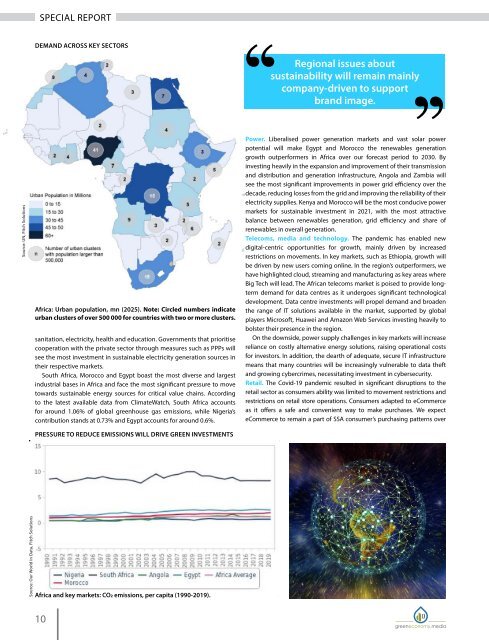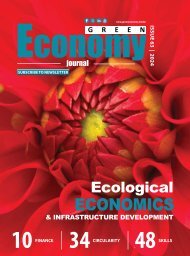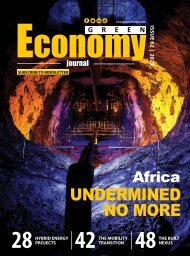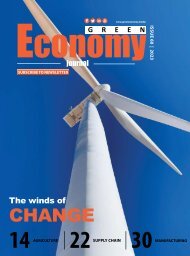Green Economy Journal Issue 49
Create successful ePaper yourself
Turn your PDF publications into a flip-book with our unique Google optimized e-Paper software.
SPECIAL REPORT<br />
SPECIAL REPORT<br />
Source: UN, Fitch Solutions<br />
DEMAND ACROSS KEY SECTORS<br />
Africa: Urban population, mn (2025). Note: Circled numbers indicate<br />
urban clusters of over 500 000 for countries with two or more clusters.<br />
sanitation, electricity, health and education. Governments that prioritise<br />
cooperation with the private sector through measures such as PPPs will<br />
see the most investment in sustainable electricity generation sources in<br />
their respective markets.<br />
South Africa, Morocco and Egypt boast the most diverse and largest<br />
industrial bases in Africa and face the most significant pressure to move<br />
towards sustainable energy sources for critical value chains. According<br />
to the latest available data from ClimateWatch, South Africa accounts<br />
for around 1.06% of global greenhouse gas emissions, while Nigeria’s<br />
contribution stands at 0.73% and Egypt accounts for around 0.6%.<br />
PRESSURE TO REDUCE EMISSIONS WILL DRIVE GREEN INVESTMENTS<br />
Regional issues about<br />
sustainability will remain mainly<br />
company-driven to support<br />
brand image.<br />
Power. Liberalised power generation markets and vast solar power<br />
potential will make Egypt and Morocco the renewables generation<br />
growth outperformers in Africa over our forecast period to 2030. By<br />
investing heavily in the expansion and improvement of their transmission<br />
and distribution and generation infrastructure, Angola and Zambia will<br />
see the most significant improvements in power grid efficiency over the<br />
decade, reducing losses from the grid and improving the reliability of their<br />
electricity supplies. Kenya and Morocco will be the most conducive power<br />
markets for sustainable investment in 2021, with the most attractive<br />
balance between renewables generation, grid efficiency and share of<br />
renewables in overall generation.<br />
Telecoms, media and technology. The pandemic has enabled new<br />
digital-centric opportunities for growth, mainly driven by increased<br />
restrictions on movements. In key markets, such as Ethiopia, growth will<br />
be driven by new users coming online. In the region’s outperformers, we<br />
have highlighted cloud, streaming and manufacturing as key areas where<br />
Big Tech will lead. The African telecoms market is poised to provide longterm<br />
demand for data centres as it undergoes significant technological<br />
development. Data centre investments will propel demand and broaden<br />
the range of IT solutions available in the market, supported by global<br />
players Microsoft, Huawei and Amazon Web Services investing heavily to<br />
bolster their presence in the region.<br />
On the downside, power supply challenges in key markets will increase<br />
reliance on costly alternative energy solutions, raising operational costs<br />
for investors. In addition, the dearth of adequate, secure IT infrastructure<br />
means that many countries will be increasingly vulnerable to data theft<br />
and growing cybercrimes, necessitating investment in cybersecurity.<br />
Retail. The Covid-19 pandemic resulted in significant disruptions to the<br />
retail sector as consumers ability was limited to movement restrictions and<br />
restrictions on retail store operations. Consumers adapted to eCommerce<br />
as it offers a safe and convenient way to make purchases. We expect<br />
eCommerce to remain a part of SSA consumer’s purchasing patterns over<br />
the coming years. This will be supported by the region’s high mobile internet<br />
penetration rate and increasing investments in eCommerce services by<br />
consumer facing business such Mass Grocery Retailers (MGR) and clothing,<br />
footwear and accessories retailers. Video on-demand services are in the early<br />
stages of development and adoption in the SSA region as it has historically<br />
been dominated by pay-TV services. However, over the coming years, we<br />
expect streaming to make up a larger share of entertainment consumption,<br />
particularly as players in the industry are making efforts to invest in content<br />
that appeals to audiences across the region.<br />
Healthcare. Digital health will strengthen healthcare operations, while<br />
telemedicine will increase health access in rural areas. Growing mobile<br />
phone ownership and internet access will further facilitate growth<br />
in digital health after the pandemic, although challenges remain.<br />
Environmental sustainability in the medical device industry is still a minor<br />
issue considering the health benefits associated with the sector. Complex<br />
supply chains due to an over reliance of imports in SSA contribute<br />
to greenhouse gas emissions, but a complete ban on plastics in the<br />
medical device industry is still very unlikely and sustainable packaging<br />
will continue to become increasingly important. Regional issues about<br />
sustainability will remain mainly company-driven to support brand image.<br />
Autos. Digital logistics start-ups and rising M&A activity will be key in the<br />
development of tech-enabled freight and logistics solutions across SSA.<br />
This will drive growth in new commercial vehicles sales in the region.<br />
Ecommerce proliferation across the region is helping to drive last-mile<br />
delivery solutions and this in turn will boost light commercial vehicles<br />
and motorcycle sales. The growth of ecommerce and e-logistics will drive<br />
sustainable transportation initiatives as firms embrace environmental, social<br />
and corporate governance (ESG) initiatives by renewing Africa’s ageing CV<br />
fleet that is often more polluting and promote electric vehicles (EVs).<br />
Although the sustainability drive in Africa will lag that of the rest of the<br />
world, there are a few pockets of the continent’s automotive industry that<br />
READ REPORT<br />
THOUGHT [ECO]NOMY<br />
greeneconomy/report recycle<br />
AFRICA BEYOND THE PANDEMIC: Tech, Sustainability & Regional Trade<br />
Transformation | Fitch Solutions [September 2021]<br />
The Covid-19 pandemic has catalysed stronger progress towards digitalisation across key<br />
industries targeting Africa’s rapidly urbanising population. Sustainability will be more of a focus<br />
area, though targets will differ by country, and key initiatives will gain traction in varying degrees<br />
across industries, with the consumer and retail, autos and technology sectors best placed to lead.<br />
Heavy industry will also play a key role, as the region’s population is set to benefit from higher<br />
electrification rates and a recovery in domestic and global demand for products as well as stable<br />
and strong long-term trade growth, which will support road and port infrastructure construction.<br />
The report reveals:<br />
• How Covid-19 has accelerated e-Commerce and digital health uptake in SSA<br />
• The outlook for Africa’s data centre market<br />
• The acceleration of sustainability initiatives in SSA’s food and drink industry post-Covid-19<br />
ORDER REPORT HERE FOR US$995<br />
fitchsolutions.com<br />
offer opportunities to improve sustainability. E-logistics firms will be at<br />
the forefront of purchasing EVs as the income gained from transportation<br />
services rendered will be used to cover some of the purchasing costs. We<br />
note that as businesses in Africa increasingly drive towards a higher degree<br />
of sustainability, they will find it easier to source funding for sustainable<br />
projects amid the ESG investing boom.<br />
Logistics and supply chains. Deeper regional trade integration in the years<br />
ahead will allow countries to specialise and exploit economies of scale,<br />
thereby improving productivity and growth. However, pandemic-induced<br />
logistics bottlenecks have thrown global supply chains out of sync since<br />
2020, causing delays at ports, causing container shortages and recordhigh<br />
shipping rates in 2021. On the other hand, economic disruptions due<br />
to the pandemic have accelerated plans to boost economic diversification<br />
and supply chain resilience all around the world, and Africa is no exception.<br />
Increased digitalisation and streamlined customs procedures are key<br />
measures that will strengthen economic growth and deepen regional<br />
integration over the coming decade. Benefits will be concentrated in a<br />
few countries with strong logistics, security stability and those that are<br />
increasing efforts to ease trading across borders through strengthening<br />
hard and soft infrastructure.<br />
Source: Our World in Data, Fitch Solutions<br />
Africa and key markets: CO2 emissions, per capita (1990-2019).<br />
25 55 61 65<br />
Intra-Africa supply<br />
chains: digitalisation<br />
to unlock<br />
opportunities<br />
Sustainability in Africa’s<br />
autos: EVs, natural gas<br />
and ICE vehicles offer<br />
opportunities<br />
The top power<br />
markets for<br />
sustainable power<br />
investment in Africa<br />
Cooperation between public<br />
and private sector key for SSA<br />
power sector development<br />
post-pandemic<br />
This commentary is published by Fitch Solutions Country Risk & Industry Research and is not a comment on Fitch ratings’ credit ratings. Any comments or data included in the report are solely derived from Fitch<br />
Solutions Country Risk & Industry Research and independent sources. Fitch Ratings analysts do not share data or information with Fitch Solutions Country Risk & Industry Research.<br />
10<br />
11


















